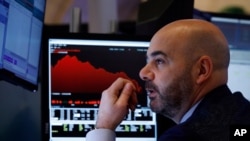Federal Reserve Chairman Jerome Powell said Friday that although the coronavirus outbreak posed "evolving risk," the U.S. economy remained in a good position.
"The fundamentals of the U.S. economy remain strong," Powell said in an unscheduled statement.
He added, "The Federal Reserve is closely monitoring developments and their implications for the economic outlook. We will use our tools and act as appropriate to support the economy."
Analysts said his comments were a strong signal of a likely rate cut, perhaps at the Fed's next meeting mid-March.
Meanwhile, stock markets around the world plunged further Friday on spreading fears over the impact of the coronavirus.
The Dow Jones industrial average fell 357 points Friday, or 1.4%, to 25,409. The S&P 500 fell 0.8%, a day after the biggest percentage drop in U.S. markets since August 2011. The tech-heavy Nasdaq Composite Index closed mostly flat, gaining less than 1 point.
Some indexes closed out their worst week since the financial crisis in 2008. Investors have rushed to sell stocks this week, anxious about an economic slowdown. COVID-19 has disrupted supply chains, caused the initiation of travel bans, and hampered many business and trade sectors around the world.
Stock markets in parts of the world worst affected by the virus shed substantial ground.
The Nikkei 225 in Japan closed down 3.7 percent, the KOSPI in South Korea dropped 3.3 percent and the Shanghai Composite in China dropped 3.7 percent.
In Europe, the FTSE 100 in Britain and the DAX in Germany fell more than 4 percent. Leading European stock markets have tumbled around 12 percent in just one week. Travel and leisure stocks were among the biggest losers in the European market, as people continued to cancel travel.
On Thursday, the Dow suffered its largest points loss on record, shedding almost 1,200 points.
Technology stocks were down Thursday, with such giants as Apple and Microsoft warning the virus has affected its supply lines from Asia.
Energy stocks also took a beating in part over a recent drop in oil prices and anticipation that fewer people will travel because of the virus.





